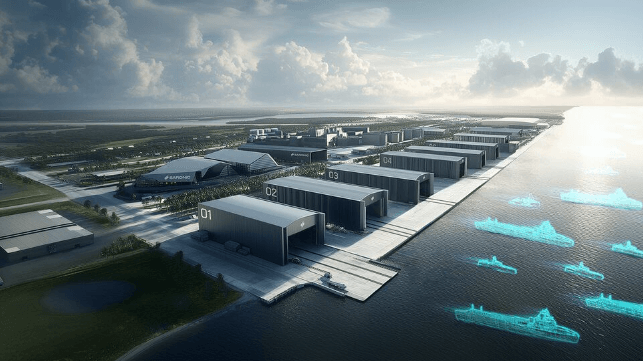Saronic Rethinks the Idea of the Shipyard for an Autonomous Future

A vessel-autonomy company led by a management team of Navy, Tesla and SpaceX veterans plans to start its own U.S. shipyard with $600 million in venture-capital financing - and it has the cash in hand. Austin-based Saronic is planning the most ambitious infrastructure venture in autonomous navigation in the West, and it hopes to bypass shipyard labor constraints through advanced automation.
Saronic's primary client is the U.S. Navy, and to date, Saronic's vessel classes have been at the small end. It has models measuring up to 24 feet in length, and produces them in-house. Small unmanned vessels have inherent limitations with range and weather, but have proven their battlefield value with Ukrainian forces in the Black Sea.
Saronic has plans to build a "larger" autonomous vessel class, and though it has not published specifics, its promotional illustrations indicate vessels in the crewboat size range - a familiar format from the "Ghost Fleet Overlord" USV program. Compared to the Navy's own design-build programs for manned warships, Saronic is moving very quickly: All three of its small models went from concept to in-water prototypes in just six months, and it has grown into a 300-person company with nearly $1 billion raised in less than three years.
"We're going to take those same principles of mission-centric design, of affordability and scalability and the most advanced software in the world and we're going to move that into autonomous ships and autonomous shipbuilding for the Navy," CEO Dino Mavrookas told Defense One. He pledged billions of dollars in investment and a program to restore U.S. shipbuilding at a scale "we have not seen since WWII."
Saronic is still looking for a location for its future "Port Alpha" yard, but it plans to have a real facility on acreage within five years. That future yard will look different, according to the firm. Saronic's management team is not from the shipbuilding sector, and it plans to "rethink the mechanics of shipbuilding from the foundation up, leveraging insights from the last decade of domestic manufacturing improvements." The objective is to remove inefficiencies through a production-line approach, saving money and improving quality.
"We're looking at a new class of vessels with a new way of building them, unburdened by what some of the constraints the current shipbuilding industrial base are hindered by," Saronic co-founder Rob Lehman told reporters.
